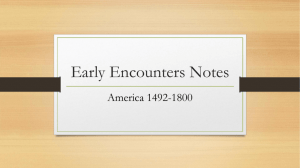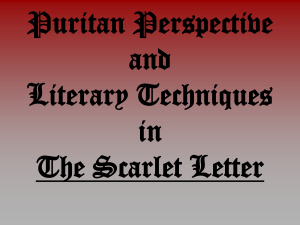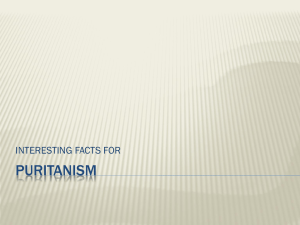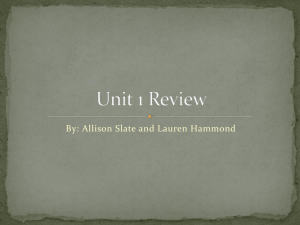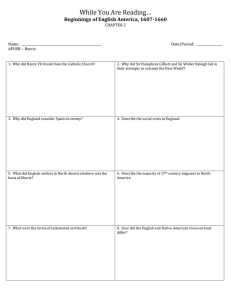Document 14069827
advertisement
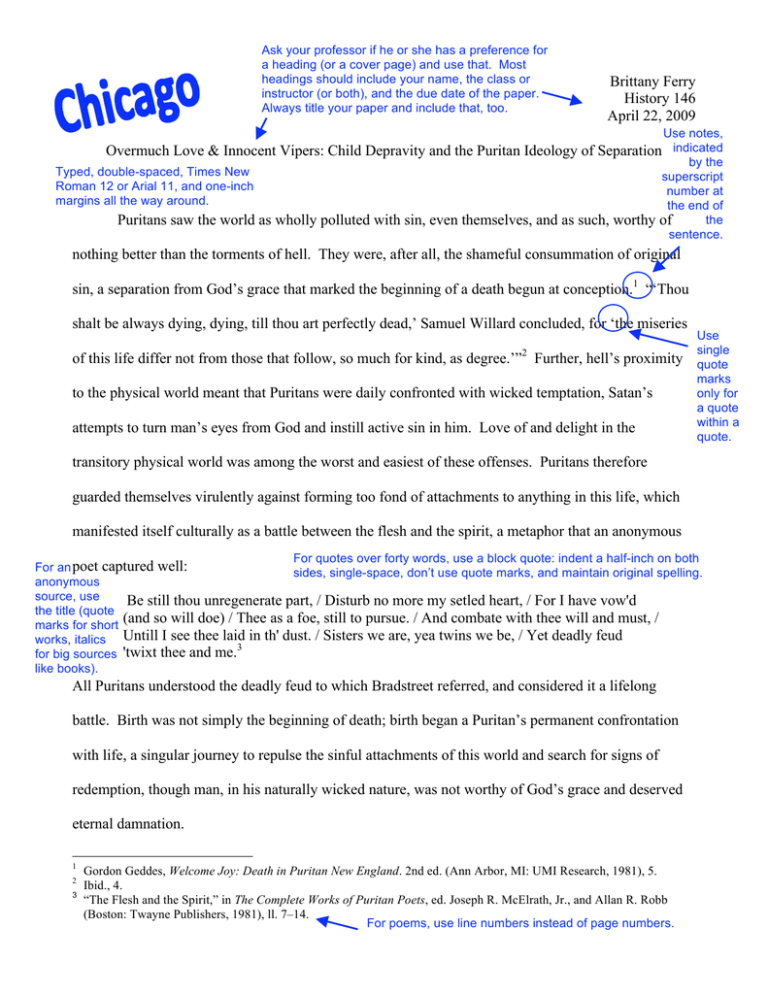
Ask your professor if he or she has a preference for a heading (or a cover page) and use that. Most headings should include your name, the class or instructor (or both), and the due date of the paper. Always title your paper and include that, too. Brittany Ferry History 146 April 22, 2009 Use notes, Overmuch Love & Innocent Vipers: Child Depravity and the Puritan Ideology of Separation indicated Typed, double-spaced, Times New Roman 12 or Arial 11, and one-inch margins all the way around. Puritans saw the world as wholly polluted with sin, even themselves, and as such, worthy by the superscript number at the end of the of sentence. nothing better than the torments of hell. They were, after all, the shameful consummation of original sin, a separation from God’s grace that marked the beginning of a death begun at conception.1 “‘Thou shalt be always dying, dying, till thou art perfectly dead,’ Samuel Willard concluded, for ‘the miseries 2 of this life differ not from those that follow, so much for kind, as degree.’” Further, hell’s proximity to the physical world meant that Puritans were daily confronted with wicked temptation, Satan’s attempts to turn man’s eyes from God and instill active sin in him. Love of and delight in the Use single quote marks only for a quote within a quote. transitory physical world was among the worst and easiest of these offenses. Puritans therefore guarded themselves virulently against forming too fond of attachments to anything in this life, which manifested itself culturally as a battle between the flesh and the spirit, a metaphor that an anonymous For quotes over forty words, use a block quote: indent a half-inch on both For an poet captured well: sides, single-space, don’t use quote marks, and maintain original spelling. anonymous source, use Be still thou unregenerate part, / Disturb no more my setled heart, / For I have vow'd the title (quote (and so will doe) / Thee as a foe, still to pursue. / And combate with thee will and must, / marks for short works, italics Untill I see thee laid in th' dust. / Sisters we are, yea twins we be, / Yet deadly feud 3 for big sources 'twixt thee and me. like books). All Puritans understood the deadly feud to which Bradstreet referred, and considered it a lifelong battle. Birth was not simply the beginning of death; birth began a Puritan’s permanent confrontation with life, a singular journey to repulse the sinful attachments of this world and search for signs of redemption, though man, in his naturally wicked nature, was not worthy of God’s grace and deserved eternal damnation. 1 2 3 Gordon Geddes, Welcome Joy: Death in Puritan New England. 2nd ed. (Ann Arbor, MI: UMI Research, 1981), 5. Ibid., 4. “The Flesh and the Spirit,” in The Complete Works of Puritan Poets, ed. Joseph R. McElrath, Jr., and Allan R. Robb (Boston: Twayne Publishers, 1981), ll. 7–14. For poems, use line numbers instead of page numbers. The Puritan did have an escape from the fiery depths of hell: God’s election. Puritan theology recognized predestination, the idea that God chose to save a select number of souls from hell before birth. Thus, technically, the Puritan could do nothing for his own salvation, other than accept God’s will and search for signs that he might be among God’s elect.4 Add clarifying information to a quote with square brackets. Close up From this idea sprang the covenant of grace, in which man “turned up toward God’s eternal the single and double quotes, counsel” and accepted his omnipotence; “the covenant, he [William Perkins] said, is ‘absolutely even if it’s at the same necessary for salvation.’”5 Further, Puritan society ordained that man had to freely enter the covenant. spot. God chose his elect, but in turn, man had to choose God. Puritans socially acknowledged man’s acceptance of God through the conversion experience, which struck one suddenly—a “heart wrenched from depravity to grace”6—but man had to predispose or prepare himself before it could occur. Further, to socially legitimize a conversion experience, one had to relate it convincingly to the heads of the church in order to gain church membership. Without membership, a person would not be considered among God’s elect or considered a full member of society. Therefore, the conversion experience was a critical part of every Puritan’s life, both socially and spiritually. “The most crucial event in the life of each person was his effectual calling or conversion which turned him once for all from death to life.”7 It was in this way alone, Puritans believed, that man could be saved the horrors of hell and of death. The citation is a little different between the footnote and the bibliography. The first author’s name is inverted for the bib (so Perry Miller Miller, Perry). The punctuation changes, too. There are more commas between items in the note and more periods in the bib. For books, the publication info is in parentheses in the note and not in the bib. Pay attention to the punctuation in both the notes and the bibliography. 4 Pages in Roman numerals work just like regular pages Multiple sources separated by a semi-colon Perry Miller, The New England Mind: The Seventeenth Century (London: Oxford University Press, 1939), vii; Jeffrey A. Hammond, “The American Puritan Elegy: A Literary and Cultural Study.” William and Mary Quarterly, 48.2 (May 1, 2000): 268–271. 5 Norman Pettit and David E. Stannard, “The Heart Prepared: Grace and Conversion in Puritan Spiritual Life,” Department of History, Yale University, 2006, http://www.yale.edu/history/staff/n_pettit/pubs.html (accessed April 14, 2009), para. “Ibid.” means the reference is the same as the previous one. If the source is the same and the 14. 6 page changes, put a comma after “Ibid.” (which always has a period) and add the new page. Ibid., para. 7. 7 Hammond, “The American Puritan Elegy,” 36. For websites, count After the first full citation, the short form has last name(s), short form of paragraphs and not pages. the title (no subtitle, and maintain italics or quotation marks), and page. Alphabetize by the first word in the entry, but ignore “A,” “An,” and “The.” Always give editors’ names for anthologies or books, but not for journals. If citing the whole work and not just one chapter/article from it, alphabetize under editor name with (ed.). Bibliography Inclusive page(s) of the short work in the big one. Last name first (but“The Flesh and the Spirit.” In The Complete Works of Puritan Poets, ed. Joseph R. McElrath, Jr., and only for Allan R. Robb. Boston: Twayne Publishers, 1981. 68. Include city of publication (and state, if it’s not a well known city), publisher, and year of publication. the first name in Geddes, Gordon. Welcome Joy: Death in Puritan New England. 2nd ed. Ann Arbor, MI: UMI the entry). Research, 1981. Use the full page range of the article, not just what you used. Hammond, Jeffrey A. “The American Puritan Elegy: A Literary and Cultural Study.” William and Include Mary Quarterly, 48.2 (May 1, 2000): 24–47, http://ezproxy.ghc.edu:2048/login?url (accessed April volume (48) and issue if 14, 2009). provided (2) and the Miller, Perry. The New England Mind: The Seventeenth Century. London: Oxford University Press, month and 1939. Use title case for all titles. Put short works like articles year after in quotation marks and titles of big works in italics. the title. Pettit, Norman, and David E. Stannard. “The Heart Prepared: Grace and Conversion in Puritan Spiritual Life.” Department of History, Yale University, 2006, http://www.yale.edu/history /staff/n_pettit/pubs.html (accessed April 14, 2009). If the site is hosted by a group that will give Websites include the date the info was last updated (first date), the URL, and the date of access. the info better credibility (universities, usually), then include that after the title. Here, the punctuation is bolded and large to make it easy to see; your finished page will not have that. “The Flesh and the Spirit.” The Complete Works of Puritan Poets, ed. Joseph R. McElrath, Jr., and Allan R. Robb. Boston: Twayne Publishers, 1981. 68. , . . . , : Geddes Gordon Welcome Joy: Death in Puritan New England 2nd ed Ann Arbor MI UMI , . Research 1981 , . “The American Puritan Elegy: A Literary and Cultural Study.” William and Mary Quarterly, 48.2 (May 1, 2000): 24–47, http://ezproxy.ghc.edu:2048/login?url (accessed April 14, 2009). Hammond Jeffrey A , . . : Miller Perry The New England Mind: The Seventeenth Century London Oxford University Press . 1939 , , . “The Heart Prepared: Grace and Conversion in Puritan Spiritual Life.” Department of History, Yale University, 2006, http://www.yale.edu/history /staff/n_pettit/pubs.html (accessed April 14, 2009). Pettit Norman and David E. Stannard © Brittany Ferry, 2009 ,

